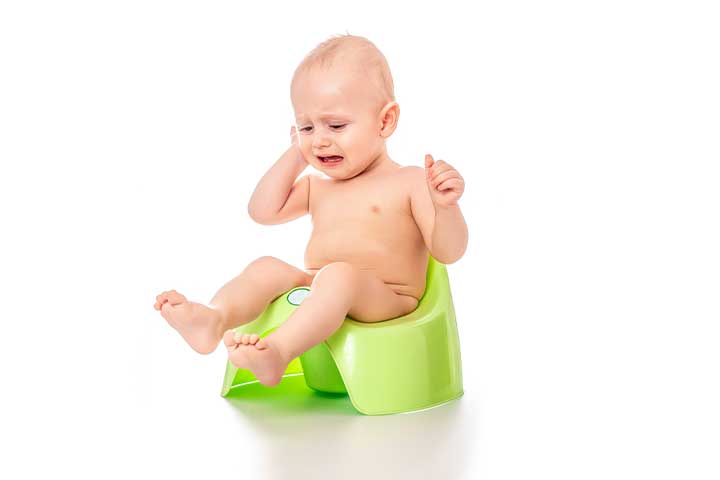
Image: Shutterstock
As a parent, you’re always attuned to your baby’s well-being. When you notice your little one struggling with irregular bowel movements, it is natural to feel concerned. This article explores constipation in babies aged 0 to 1, including what it is, what’s normal, the symptoms, causes, when to consult a doctor, and prevention. Read on to know more!
What Is Constipation?
Image: Shutterstock
Constipation, typically associated with infrequent or challenging bowel movements and the passage of hard, dry stools, is often linked to adults. However, it’s important to note that constipation in babies differs from what’s considered normal for adults.
What Is Normal For Babies?
Image: Shutterstock
During the initial year of life, a baby’s digestive system is in the midst of development and adaptation to new foods and processes. Consequently, their bowel movements may exhibit notable variations in both frequency and texture. For instance, breastfed infants typically pass soft, mustard-yellow stools multiple times daily, while formula-fed babies may have fewer and slightly firmer stools. It’s also not uncommon for babies to occasionally skip a day or two without a bowel movement, which is generally considered normal, provided the stool remains soft and the baby seems comfortable.
What Are The Symptoms Of Constipation In Babies?
Image: Shutterstock
Constipation in babies can manifest with various symptoms. While one or more of these signs may suggest constipation, it’s important to recognize that each baby is unique, and what’s typical for one may not be for another. Common indicators of constipation in babies include:
1. Infrequent Bowel Movements
A significant decrease in your baby’s stool frequency, with several days passing between movements, may signal constipation.
2. Hard, Dry Stools
When your baby’s stool becomes firm, dry, and difficult to pass, it could be a sign of constipation.
3. Struggling And Discomfort
If your baby appears to be exerting effort and seems uncomfortable or in pain during a bowel movement, constipation might be the cause.
4. Increased Fussiness And Irritability
Babies experiencing constipation may become more fussy or irritable than usual due to discomfort.
5. Blood In Stool
In severe cases, constipation can result in small streaks of blood on the surface of the stool or in the diaper. If you observe this, seek immediate medical attention.
What Causes Constipation In Babies?
Image: Shutterstock
Several factors can contribute to constipation in babies, including:
1. Diet
Introducing solid foods or changes in formula can affect your baby’s digestion. Some foods, like rice cereal, can be binding and may lead to constipation.
2. Dehydration
Inadequate fluid intake, especially in hot weather or when your baby is unwell, can contribute to constipation.
3. Lack Of Fiber
If your baby’s diet lacks sufficient fiber from fruits and vegetables, it can lead to constipation.
4. Medications
Certain medications can affect bowel movements. If your baby is on medication, consult your pediatrician if you suspect it’s causing constipation.
When Should I See My Doctor?
Image: Shutterstock
While occasional episodes of constipation are common and often resolve on their own, it’s crucial to consult your pediatrician if you notice persistent or severe constipation in your baby. Additionally, seek medical attention if your baby experiences the following:
1. Blood In Stool
If you observe blood in your baby’s stool, it’s essential to contact your doctor promptly.
2. Vomiting
Continuous vomiting along with constipation could indicate an underlying issue and should be evaluated by a healthcare professional.
3. Weight Loss
If your baby is losing weight or not gaining weight as expected, it’s a cause for concern and requires medical assessment.
4. Severe Discomfort
If your baby appears very distressed, or has a swollen abdomen, immediate medical attention is necessary.
How Is Constipation Treated?
Image: Shutterstock
Treating constipation in babies often involves simple and gentle interventions. Here are some strategies to address and prevent constipation:
1. Dietary Adjustments
For breastfed babies, ensure they are feeding frequently, as breast milk has a natural laxative effect. If your baby is formula-fed, talk to your pediatrician about the possibility of switching to a formula with a different composition that may be easier to digest. Introduce age-appropriate, fiber-rich foods when you start weaning your baby onto solid foods.
2. Hydration
Ensure your baby is adequately hydrated by offering small sips of water (if they’re six months or older) between feeds.
3. Tummy Massage
Gently massage your baby’s abdomen in a clockwise direction to help stimulate bowel movements.
4. Bicycle Legs
Encourage your baby to move their legs in a cycling motion while lying on their back to help relieve gas and promote bowel movements.
5. Warm Bath
A warm bath can help relax your baby’s muscles and ease discomfort.
6. Medications
You can consider over-the-counter laxatives or glycerin suppositories under the guidance of your pediatrician.
7. Consult A Doctor
If constipation persists or is accompanied by concerning symptoms, consult your pediatrician for a thorough evaluation and guidance.
Constipation in babies can be distressing, but it’s essential to remember that it’s a common issue and usually manageable with proper care and attention. Pay close heed to your baby’s symptoms and don’t hesitate to consult your pediatrician if you have concerns. With your love and care, you can help your little one navigate the discomfort of constipation and ensure they grow up healthy and happy.


















